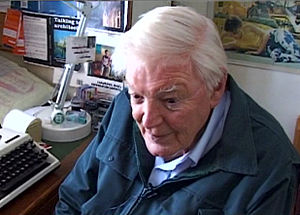- Colin Ward
-
For other people named Colin Ward, see Colin Ward (disambiguation).
Colin Ward (Wanstead, 14 August 1924 – Ipswich, 11 February 2010) was a British anarchist writer. He has been called "one of the greatest anarchist thinkers of the past half century, and a pioneering social historian." [1]
Contents
Life
Ward was born in Wanstead, Essex. He became an anarchist while in the British Army during World War II. As a subscriber to War Commentary, the war-time equivalent of Freedom, he was called in 1945 from Orkney, where he was serving, to give evidence at the London trial of the editors for publishing an article allegedly intended to seduce soldiers from their duty or allegiance. Ward robustly repudiated any seduction, but the three editors (Philip Sansom, Vernon Richards and John Hewetson) were convicted and sentenced to nine months imprisonment.
He was an editor of the British anarchist newspaper Freedom from 1947 to 1960, and the founder and editor of the monthly anarchist journal Anarchy from 1961 to 1970.[2]
From 1952 to 1961, Ward worked as an architect. In 1971, he became the Education Officer for the Town and Country Planning Association. He published widely on education, architecture and town planning. His most influential book was The Child In The City (1978), about children's street culture. From 1995-6, Ward was Centennial Professor of Housing and Social Policy at the London School of Economics.[3]
In 2001, Ward was made an Honorary Doctor of Philosophy at Anglia Ruskin University.[4]
Property
Most of Ward's works deal with the issue of rural housing and the problems of overpopulation and planning regulations in Britain to which he proposed anarchistic solutions. He was a keen admirer of architect Walter Segal who set up a ‘build it yourself’ system in Lewisham meaning that land that was too small or difficult to build on conventionally was given to people who with Segal’s help would build their own homes. Ward was very keen on the idea of ‘build it yourself’ having said in response to the proposition of removing all planning laws, ‘I don't believe in just letting it rip, the rich get away with murder when that happens. But I do want the planning system to be flexible enough to give homeless people a chance’. In his book Cotters and Squatters, Ward described the historical development of informal customs to appropriate land for housing which frequently grew up in opposition to legally constituted systems of land ownership. Ward described folkways in many cultures which parallel the Welsh tradition of the Tŷ unnos or 'one night house' erected on common land.
Ward included a passage from one of his anarchist forebears, Peter Kropotkin, who said of the empty and overgrown landscape of Surrey and Sussex at the end of the 19th century, ‘in every direction I see abandoned cottages and orchards going to ruin, a whole population has disappeared.’ Ward himself went on to observe: ‘Precisely a century after this account was written, the fields were empty again. Fifty years of subsidies had made the owners of arable land millionaires through mechanised cultivation and, with a crisis of over-production; the European Community was rewarding them for growing no crops on part of their land. However, opportunities for the homeless poor were fewer than ever in history. The grown-up children of local families can’t get on the housing ladder’. Wards solution was that ‘there should be some place in every parish where it's possible for people to build their own homes, and they should be allowed to do it a bit at a time, starting in a simple way and improving the structure as they go along. The idea that a house should be completed in one go before you can get planning permission and a mortgage is ridiculous. Look at the houses in this village. Many of them have developed their character over centuries - a bit of medieval at the back, with Tudor and Georgian add-ons.’
Anarchism
Ward’s philosophy aimed at removing authoritarian forms of social organisation and replacing them with self-managed, non-hierarchical forms. This form of federalism was put forward in part by Kropotkin and Proudhon and is based upon the principle that, as Ward put it, ‘in small face-to-face groups, the bureaucratising and hierarchical tendencies inherent in organisations have least opportunity to develop’. He particularly admired the Swiss system of direct democracy and cantons whereby each canton is run by its members who have control on the laws placed upon them.
‘I believe that the social ideas of anarchism: autonomous groups, spontaneous order, workers’ control, the federative principle, add up to a coherent theory of social organisation which is a valid and realistic alternative to the authoritarian, hierarchical and institutional social philosophy which we see in application all around us. Man will be compelled, Kropotkin declared, ‘to find new forms of organisation for the social functions which the State fulfils through the bureaucracy’ and he insisted that ‘as long as this is not done nothing will be done. I think we have discovered what these new forms of organisation should be. We have now to make the opportunities for putting them into practice’.
Quotations
‘You may think in describing anarchism as a theory of organisation I am propounding a deliberate paradox: ‘anarchy’ you may consider to be, by definition, the opposite of organisation. In fact, however, ‘anarchy’ means the absence of government, the absence of authority. Can there be social organisation without authority, without government? The anarchists claim that there can be, and they also claim that it is desirable that there should be. They claim that, at the basis of our social problems is the principle of government. It is, after all, governments which prepare for war and wage war, even though you are obliged to fight in them and pay for them; the bombs you are worried about are not the bombs which cartoonists attribute to the anarchists, but the bombs which governments have perfected, at your expense. It is, after all, governments which make and enforce the laws which enable the 'haves' to retain control over social assets rather than share them with the 'have-nots'. It is, after all, the principle of authority which ensures that people will work for someone else for the greater part of their lives, not because they enjoy it or have any control over their work, but because they see it as their only means of livelihood.'
‘I said that it is governments which make wars and prepare for wars, but obviously it is not governments alone - the power of a government, even the most absolute dictatorship, depends on the tacit assent of the governed. Why do people consent to be governed? It isn't only fear: what have millions of people to fear from a small group of politicians? It is because they subscribe to the same values as their governors. Rulers and ruled alike believe in the principle of authority, of hierarchy, of power. These are the characteristics of the political principle. The anarchists, who have always distinguished between the state and society, adhere to the social principle, which can be seen wherever men link themselves in an association based on a common need or a common interest. ‘The State’ said the German anarchist Gustav Landauer, ‘is not something which can be destroyed by a revolution, but is a condition, a certain relationship between human beings, a mode of human behaviour; we destroy it by contracting other relationships, by behaving differently.’
‘In my experience there are two kinds of Green people. There are philanthropists (lovers of humankind), who see the revolution in communications and the collapse of the city economy as the opportunity for the greening of the dense Victorian city. And there are the misanthropists (haters of humanity), who want to pull up the drawbridge to exclude those urban hordes from ‘rural’ England, which they quaintly equate with a ‘natural’ environment. They want to keep those beastly city-dwellers in the urban ghetto. The rich, of course, know the advantages of both environments and have a country seat and a pad in town.’
Bibliography
- Autonomy, Solidarity, Possibility: The Colin Ward Reader (edited by Damian F. White and Chris Wilbert) (2011)
- Anarchism: A Very Short Introduction (2004)
- Cotters and Squatters: The Hidden History of Housing (2004)
- Talking Anarchy (with David Goodway) (2003)
- Sociable Cities: The Legacy of Ebenezer Howard (with Peter Hall) (1999)
- Reflected in Water: a Crisis of Social Responsibility (1997)
- Havens and Springboards: The Foyer Movement in Context (1997)
- Stamps: Designs For Anarchist Postage Stamps (illustrated by Clifford Harper) (1997)
- New Town, Home Town (1993)
- Freedom to Go: After the Motor Age (1991)
- Talking Houses: 10 Lectures (1990)
- Undermining the Central Line (with Ruth Rendell) (1989)
- Welcome, Thinner City: Urban Survival in the 1990s (1989)
- The Allotment: Its Landscape and Culture (with David Crouch) (1988)
- The Child in the Country (1988)
- A Decade of Anarchy (1961-1970) (1987)
- Chartres: the Making of a Miracle (1986)
- Goodnight Campers! The History of the British Holiday Camp (with Dennis Hardy) (1986)
- When We Build Again: Let's Have Housing that Works! (1985)
- The Child In The City (1978)
- Housing: An Anarchist Approach (1976)
- British School Buildings: Designs and Appraisals 1964-74 (1976)
- Tenants Take Over (1974)
- Utopia (1974)
- Vandalism (ed.) (1974)
- Anarchy in Action (1973)
- Streetwork: The Exploding School with journalist Anthony Fyson (1973)
- Work (1972)
Critical work on Colin Ward
- Remembering Colin Ward (Five Leaves Press 2011)
- Anarchist Seeds Beneath the Snow by David Goodway (2006)
- Richer Futures. Fashioning A New Politics (Earthscan, 1999)
- Making Anarchism Respectable? The Social Philosophy of Colin Ward (Stuart White, 2007)
References
External links
- Colin Ward archive at The Anarchist Library
- Ward's Anarchism as a Theory of Organization (1966)
- Daily Telegraph obituary, 29 March 2010
- Guardian obituary, 22 February 2010
- The Good Life of a Gentle Anarchist, Boyd Tonkin, The Independent, 19 February 2010
- Colin Ward, Pioneer of Mutualism
- Obituary at Outrospection.org
- Autonomy, Solidarity, Possibility: The Colin Ward Reader
- Center for a Stateless Society on Ward
- Ward and Five Leaves publishers
- Ward and the Essex plotlanders, Guardian, 7 March 2010
- Inveterate anarchist with a plan to put roofs over the rural poor, Guardian, 10 July 2002
- A friendly right-wing view of Colin Ward, by the editor of Reason, 'the magazine of free minds and free markets'
Freedom Press Periodicals Anarchy · Freedom · Freedom Bulletin · The Raven · Revolt! · Spain and the World · The Voice of Labour · War CommentaryIndividuals Alan Albon · Marie-Louise Berneri · Clifford Harper · Thomas Keell · Harry Kelly · Peter Kropotkin · Albert Meltzer · Max Nettlau · Peter Neville · Vernon Richards · Donald Rooum · Philip Sansom · John Turner · Nicolas Walter · Colin Ward · Charlotte Wilson · Lilian WolfeRelated Freedom Defence Committee · The State Is Your EnemyCategories:- 1924 births
- 2010 deaths
- People from Wanstead
- British Army personnel of World War II
- English anarchists
- English newspaper editors
- Anarchism theorists
- Anarchist communists
- DIY culture
Wikimedia Foundation. 2010.


